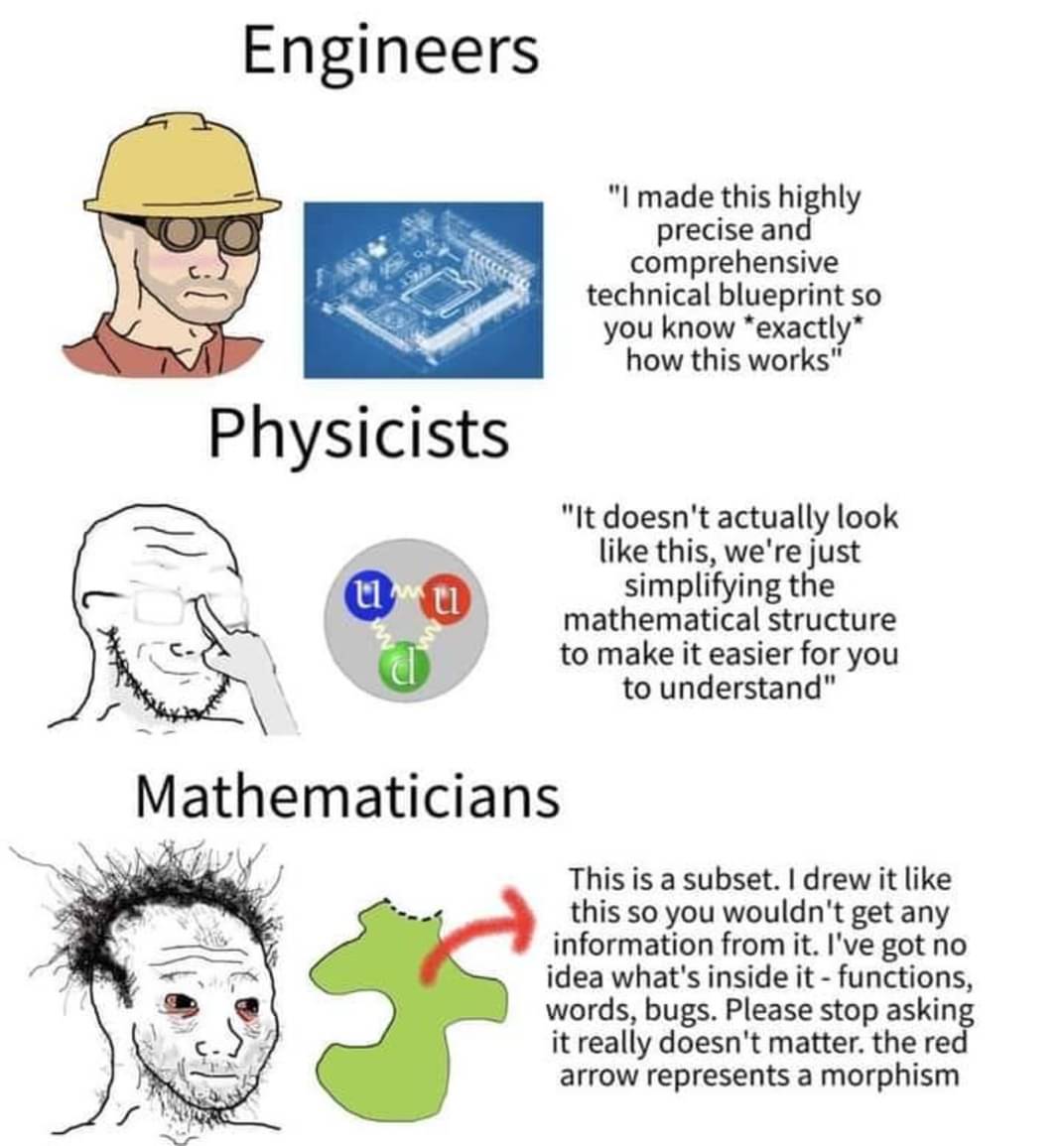this post was submitted on 09 Mar 2024
863 points (98.2% liked)
Science Memes
11189 readers
3702 users here now
Welcome to c/science_memes @ Mander.xyz!
A place for majestic STEMLORD peacocking, as well as memes about the realities of working in a lab.

Rules
- Don't throw mud. Behave like an intellectual and remember the human.
- Keep it rooted (on topic).
- No spam.
- Infographics welcome, get schooled.
This is a science community. We use the Dawkins definition of meme.
Research Committee
Other Mander Communities
Science and Research
Biology and Life Sciences
- [email protected]
- [email protected]
- [email protected]
- [email protected]
- [email protected]
- [email protected]
- [email protected]
- [email protected]
- [email protected]
- [email protected]
- [email protected]
- [email protected]
- [email protected]
- [email protected]
- [email protected]
- [email protected]
- [email protected]
- [email protected]
- [email protected]
- [email protected]
- [email protected]
- [email protected]
- [email protected]
- [email protected]
- !reptiles and [email protected]
Physical Sciences
- [email protected]
- [email protected]
- [email protected]
- [email protected]
- [email protected]
- [email protected]
- [email protected]
- [email protected]
- [email protected]
Humanities and Social Sciences
Practical and Applied Sciences
- !exercise-and [email protected]
- [email protected]
- !self [email protected]
- [email protected]
- [email protected]
- [email protected]
Memes
Miscellaneous
founded 2 years ago
MODERATORS
you are viewing a single comment's thread
view the rest of the comments
view the rest of the comments

Pure mathematician here - some of us argue "mathematics is a language", others of us argue "language gets in the way of mathematics".
The latter feels much more true; as a species we're absolutely awful when it comes to talking about abstract things. The thing is, those abstract things are often VERY interesting.
It's like making a map and being fascinated with the type of trees rather than the shape of the land, because the types of trees tell us about the climate, soil, and even history of the land.
I would say a important part of my job is to find the appropriate mathematical language to model computer programs. In my experience, using efficient language not only helps us discover more structures and connections between different kinds of program, but also leads to efficient and simplistic real-world implementations.
I would argue, from observing the development of this field, It seems like picking the right mathematical language is essential whether you are interested in theory or practicality.
I am not a mathematician, perhaps you can comment on this. From what I read, I feel like a good amount of the achievement for Grothendieck stems from finding the right language to describe the given problem. The result sometimes will follow like magic, once the correct language is discovered.
See now, I'd argue that the language comes after the mathematics. For example, I walk to work each day; part of walking to work is trying to find the route that lets me lie in the longest.
Now, humans are pretty good at exploring and finding alternative routes between locations, and they also tend to locate the shortest route given enough time.
Trying to explain how this intuitive activity works necessitates the use of graph theory. The graph theory was something our brain had constructed in the background, but it wasn't entirely conscious. Trying to explain this in natural language would take pages, however...
Given a set V of street intersections, and a set E of streets connecting two intersections, and a set W of weights assigned to each E. I can calculate the shortest route by applying one of the pathfinding algorithms (which are expressed in this notation).
This explanation will cover any pathfinding problem, but it's not great at conveying what is a really happening. The language we must use gets in the way of conveying the mathematics that is going on.
We do need a language (telepathy not being on the menu), but that language is a separate entity from the mathematics itself.
There are "mathematical languages", but these are present to describe mathematics. There are mathematical theories of language, but again the language itself is not mathematics - its structure, however, has mathematical properties.
I suppose you could say "fire has the property of being hot, but it isn't hotness itself"? Language is used to communicate mathematics, but it is not mathematics itself.
Now, this is not to discount notational developments in easing communication - that's a great branch as you have to check your new language and its rules match the mathematics it tries to describe. However, again, it's important not to conflate the thing you are describing with the thing you are using to describe it!
I say mathematics is what you write down to remember/play with logic, and it has an awkward syntax.
So, let's say you write down the words "fire is a chain reaction between carbon and oxygen that produces heat". You've characterised fire yes, but is that sentence itself the fire?
Let's say you write down the equation describing this reaction so you can play with it and manipulate it. Is this fire, or just a convenient way to talk about it?
I'd argue neither of these are fire, and both will never completely describe a fire (though they come damn close).
Look how often one branch of mathematics is found to aid solving a problem in a previously unconnected area.
This demonstrates our mathematical history and choice of language/taxonomy is suboptimal.
You know, I'd never considered that, but yes that does indeed seem to be the case!